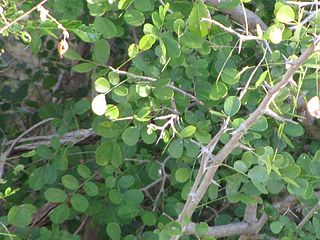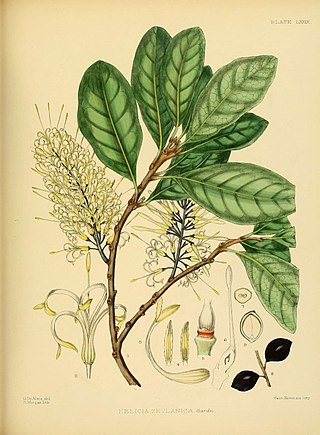
The International Union for Conservation of Nature (IUCN) Red List of Threatened Species, also known as the IUCN Red List or Red Data Book, founded in 1964, is the world's most comprehensive inventory of the global conservation status of biological species. It uses a set of precise criteria to evaluate the extinction risk of thousands of species and subspecies. These criteria are relevant to all species and all regions of the world. With its strong scientific base, the IUCN Red List is recognized as the most authoritative guide to the status of biological diversity. A series of Regional Red Lists are produced by countries or organizations, which assess the risk of extinction to species within a political management unit.

Dalbergia melanoxylon is a flowering plant in the family Fabaceae, native to seasonally dry regions of Africa from Senegal east to Eritrea and south to the north-eastern parts of South Africa. The tree is an important timber species in its native areas; it is used in the manufacture of musical instruments and fine furniture. Populations and genomic resources for genetic biodiversity maintenance in parts of its native range are threatened by overharvesting due to poor or absent conservation planning and by the species' low germination rates.

Afzelia xylocarpa is a tree from Southeast Asia. It grows in Thailand, Vietnam, Cambodia, Laos and Burma in deciduous forests. It can reach 30 metres tall with a trunk up to 2 metres in diameter in a mature specimen.

An IUCN Red List Critically Endangered species is one that has been categorized by the International Union for Conservation of Nature as facing an extremely high risk of extinction in the wild. As of 2021, of the 120,372 species currently tracked by the IUCN, there are 8,404 species that are considered to be Critically Endangered.

A species that is extinct in the wild (EW) is one that has been categorized by the International Union for Conservation of Nature as known only by living members kept in captivity or as a naturalized population outside its historic range due to massive habitat loss.

Afzelia bipindensis is an economic species of tropical forest tree in the family Fabaceae. It is found in Angola, Cameroon, Central African Republic, Republic of the Congo, Democratic Republic of the Congo, Gabon, Nigeria, and Uganda. It is threatened by habitat loss.
Afzelia pachyloba, the white afzelia or apa, is an economic species of tropical forest tree in the family Fabaceae. It is found in tropical Western and Central Africa where it is threatened by habitat loss.

Callitris rhomboidea, commonly known as the Oyster Bay pine, Tasmanian cypress pine, Port Jackson pine, Illawarra Mountain pine, or dune cypress pine, is a species of conifer in the family Cupressaceae. It is native to Australia, occurring in South Australia, Queensland, New South Wales, Victoria and Tasmania. It has become naturalized near Auckland, New Zealand and can be found on the island of Taillefer Rocks in Tasmania.

Carpoxylon macrospermum is a species of palm tree endemic to Vanuatu, and the only species in the genus Carpoxylon.

Pelagodoxa henryana is a species of palm tree, and the only species in the genus Pelagodoxa. It is found only in the Marquesas Islands of French Polynesia, where it is threatened by habitat loss.

Afzelia africana, the African mahogany, afzelia, lenke, lengue, apa, or doussi, is a tree species in the family Fabaceae.
Anisophyllea rhomboidea is a species of plant in the Anisophylleaceae family. It is found in Indonesia and Malaysia.
Eugenia rhomboidea is a species of plant in the family Myrtaceae. It is a tree endemic to Peninsular Malaysia.

Helicia is a genus of 110 species of trees and shrubs, constituting part of the plant family Proteaceae. They grow naturally in rainforests throughout tropical South and Southeast Asia, including India, Sri Lanka, Indochina, Peninsular Malaysia to New Guinea and as far south as New South Wales.
Palaquium luzoniense, also called red nato, is a species of plant in the family Sapotaceae. It is endemic to the Philippines. It is threatened by habitat loss.
Pandanus joskei is a species of plant in the family Pandanaceae. It is endemic to Fiji.

Tillandsia rhomboidea is a species of flowering plant in the family Bromeliaceae, native to Bolivia, Colombia, Costa Rica, Ecuador, Honduras, southeastern Mexico and Venezuela. It was first described by André in 1888.

Anthene larydas, the spotted hairtail or common ciliate blue, is a butterfly in the family Lycaenidae. It is found in Senegal, the Gambia, Guinea-Bissau, Guinea, Burkina Faso, Liberia, Sierra Leone, Ivory Coast, Ghana, Nigeria, Cameroon, the Republic of the Congo, the Central African Republic, the Democratic Republic of the Congo, Uganda and western Kenya. The habitat consists of forests and Guinea savanna.
Eucalyptus rhomboidea, commonly known as the diamond gum, is a species of mallet or tree that is endemic to the southwest of Western Australia. It has smooth bark, lance-shaped adult leaves, flower buds in groups of seven, pale yellow flowers and cup-shaped to funnel-shaped fruit that is glaucous at first.
Philotheca rhomboidea is a species of flowering plant in the family Rutaceae and is endemic to the south-west of Western Australia. It is a small undershrub with thick, broadly elliptic to round leaves and white to pale pink flowers arranged singly or in twos or threes at the end of branchlets.













